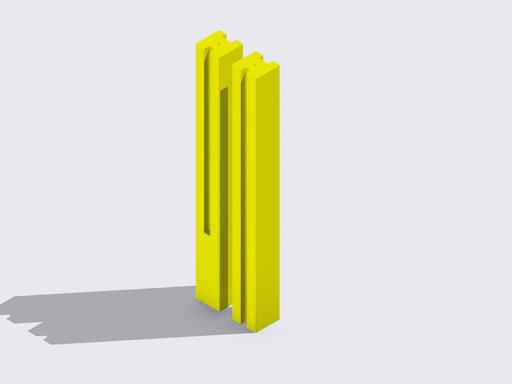3D printed 3/16th inch rod adapter
Quote from Admin on November 15, 2022, 12:55 pmAt our November launch, new member Neil Brown brought his upscaled Estes Astron Trident to fly. His upscale has launch lugs for 3/16th inch diameter rod. Sadly, because I really wanted to see it fly, the club's 3/16th inch rods were all too short.
This prompted me to design and print an adapter for my HP pad to accommodate a 3/16th inch rod. I have a 6 foot piece of 3/16th inch diameter stainless steel rod. This designed adapter will consume one foot (12 inches) of that rod. I have a milled standoff that, if placed to allow about 6 inches to the deflector plate, will provide 4.5 feet of rod guidance. This 3D printed adapter was design to fit inside of the 20mm rail adapter I fashioned for my HP pad.
The whole adapter is approximately 14¼ inches (actual length is 360mm). My printer is a Reality Ender-3 Pro which has a maximum X and Y of 220mm, so I dissected the adapter into two sections to print it. I then put the two pieces on my mill and milled about .03 inches off of the ends that would face each other to insure that they were straight and smooth. The ends were then bonded together with cyanoacrylate to make the one-piece adapter.
At our November launch, new member Neil Brown brought his upscaled Estes Astron Trident to fly. His upscale has launch lugs for 3/16th inch diameter rod. Sadly, because I really wanted to see it fly, the club's 3/16th inch rods were all too short.
This prompted me to design and print an adapter for my HP pad to accommodate a 3/16th inch rod. I have a 6 foot piece of 3/16th inch diameter stainless steel rod. This designed adapter will consume one foot (12 inches) of that rod. I have a milled standoff that, if placed to allow about 6 inches to the deflector plate, will provide 4.5 feet of rod guidance. This 3D printed adapter was design to fit inside of the 20mm rail adapter I fashioned for my HP pad.
The whole adapter is approximately 14¼ inches (actual length is 360mm). My printer is a Reality Ender-3 Pro which has a maximum X and Y of 220mm, so I dissected the adapter into two sections to print it. I then put the two pieces on my mill and milled about .03 inches off of the ends that would face each other to insure that they were straight and smooth. The ends were then bonded together with cyanoacrylate to make the one-piece adapter.

Quote from Admin on November 19, 2022, 10:07 amQuote from Ckirlew on November 18, 2022, 3:28 pmHow long of a rod does he really need?
The Estes two-piece 1/4 inch rod is 60 inches (5 feet). That would have been OK save that his launch lugs were for 3/16 rod. I'll have ample length for his upscaled Trident if he brings it at a future launch.
There was a discussion on TRF about launch rods and the consensus was:
Diameter — Length
- 1/8 inch — 48 inches
- 3/16 inch — 60 inches
- 1/4 inch — 72 inches
Some of the length is lost in the mount, exhaust deflector and standoff.
Also, for next launch, I 3D printed some spacers for the clip end of the launch leads. This will help to keep the leads from shorting. I designed it to grip electric lamp cord. This placed near the igniter clips will keep them about 1.5 cm apart.
I printed 30, more than we presently need but I figure some would get lost or burned or broken, so there are ample replacements. I can always print more. I recently picked up yellow filament too, so that should be easy to see if dropped at the pads.
Quote from Ckirlew on November 18, 2022, 3:28 pmHow long of a rod does he really need?
The Estes two-piece 1/4 inch rod is 60 inches (5 feet). That would have been OK save that his launch lugs were for 3/16 rod. I'll have ample length for his upscaled Trident if he brings it at a future launch.
There was a discussion on TRF about launch rods and the consensus was:
Diameter — Length
- 1/8 inch — 48 inches
- 3/16 inch — 60 inches
- 1/4 inch — 72 inches
Some of the length is lost in the mount, exhaust deflector and standoff.
Also, for next launch, I 3D printed some spacers for the clip end of the launch leads. This will help to keep the leads from shorting. I designed it to grip electric lamp cord. This placed near the igniter clips will keep them about 1.5 cm apart. I printed 30, more than we presently need but I figure some would get lost or burned or broken, so there are ample replacements. I can always print more. I recently picked up yellow filament too, so that should be easy to see if dropped at the pads.
I printed 30, more than we presently need but I figure some would get lost or burned or broken, so there are ample replacements. I can always print more. I recently picked up yellow filament too, so that should be easy to see if dropped at the pads.
Quote from Ckirlew on November 19, 2022, 9:23 pmMcMaster-Carr has some 6' rods for about $11. I would have to make a new tube holder. Don't know where to get a 2 piece rod of that size.
Charlie
McMaster-Carr has some 6' rods for about $11. I would have to make a new tube holder. Don't know where to get a 2 piece rod of that size.
Charlie
Quote from Admin on November 20, 2022, 6:46 amQuote from Ckirlew on November 19, 2022, 9:23 pmMcMaster-Carr has some 6' rods for about $11. I would have to make a new tube holder. Don't know where to get a 2 piece rod of that size.
Stainless steel? At that price, I'd assume it's 304. 316 would be better but it's probably 3-times that price.
As for two-piece, that'd have to be milled because I don't believe anyone is selling two-piece rods of that length. If they were, I'd be concerned that they wouldn't hold up at the joint.
Anyway, I have a 6-foot piece. I doubt there'd be all that much call for it, so I don't think the club needs to buy one. For larger rockets, rail buttons is the way to go. I've been putting mini-buttons on all my newest smaller rocket builds. The 20mm rail is much better and alleviates the rod whip.
Quote from Ckirlew on November 19, 2022, 9:23 pmMcMaster-Carr has some 6' rods for about $11. I would have to make a new tube holder. Don't know where to get a 2 piece rod of that size.
Stainless steel? At that price, I'd assume it's 304. 316 would be better but it's probably 3-times that price.
As for two-piece, that'd have to be milled because I don't believe anyone is selling two-piece rods of that length. If they were, I'd be concerned that they wouldn't hold up at the joint.
Anyway, I have a 6-foot piece. I doubt there'd be all that much call for it, so I don't think the club needs to buy one. For larger rockets, rail buttons is the way to go. I've been putting mini-buttons on all my newest smaller rocket builds. The 20mm rail is much better and alleviates the rod whip.
Quote from Admin on November 20, 2022, 7:03 amI just checked McMaster-Carr and there is 304 stainless steel tubing with OD of 3/16 inch diameter. The ID is spec'ed at .132 inch. That could allow a piece of 1/8 inch rod to be used as a pin. Lenghts of the tubing are 3-foot. Temporarily out of stock though.
I just checked McMaster-Carr and there is 304 stainless steel tubing with OD of 3/16 inch diameter. The ID is spec'ed at .132 inch. That could allow a piece of 1/8 inch rod to be used as a pin. Lenghts of the tubing are 3-foot. Temporarily out of stock though.
Quote from Ckirlew on November 20, 2022, 7:50 amThat sounds like a viable solution. I guess the big question is do we really need it? We have gone 15 years without a long 3/16 rod.
That sounds like a viable solution. I guess the big question is do we really need it? We have gone 15 years without a long 3/16 rod.


